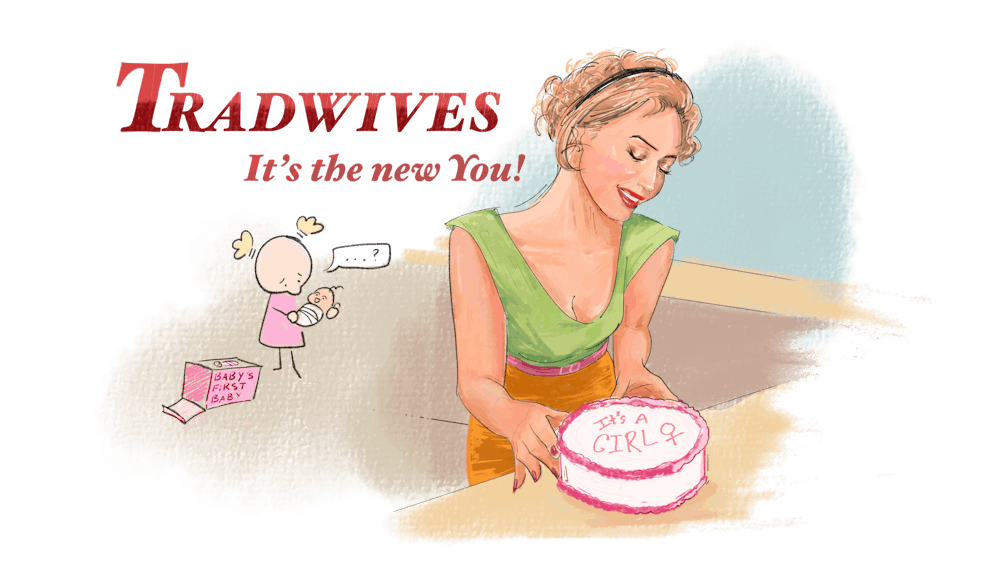The concept of the “tradwife”— short for traditional wife — has recently emerged as a social media sensation, going viral for its promised returns to traditional gender roles amid the backdrop of modern feminism’s ongoing struggle for equality. Influencers like Hannah Neeleman and Estee Williams have captivated millions with content that idealizes homemaking, all framed within a vision of a simpler, pastoral ideal of domesticity. While tradwives tout their role as women devoted primarily to their homes and husbands, this movement isn’t just about homemaking. It’s about promoting an ideology championed by traditionalists who believe a woman's worth is tied to her submission to her husband, her so-called natural role.
In their meticulously curated videos, tradwives glide through minimalist homes, narrating their days with a calm that belies the regimentation of their routines. While this lifestyle may not single-handedly reverse feminist progress, the rise of these influencers risks confusing young women still solidifying their own female identities by creating a false dichotomy between women who adhere to traditional roles and those who champion modern feminist ideals. To avoid the crippling adversarial nature of feminism versus tradwife values, modern feminism must reimagine itself for this new generation, embracing reforms that address women’s diverse needs without retreating to outdated norms.
At its core, feminism is about challenging oppressive structures that limit women’s autonomy and potential. It’s about advocating for a world in which women are free to define their own lives and identities, unshackled by restrictive societal norms. The tradwife movement, by contrast, glorifies a return to roles that feminism has historically critiqued for their inherent limitations and constraints. By romanticizing domestic submission, tradwives inadvertently support a vision of femininity that contradicts empowerment and self-determination. The feminist movement is not merely about individual choice — it is about confronting and rejecting the limitations imposed by an all-encompassing patriarchal society.
The narrative perpetuated by influencers like Neeleman and Williams is dangerously simplistic. It overlooks the structural pressures and historical context that dictate these roles. Women who choose to embrace traditional domesticity are often celebrated for their “choice,” but this celebration can obscure the systemic forces — such as economic pressures, lack of support for working families and entrenched gender norms — that continue to shape these decisions. While tradwives often frame their lifestyles as a true calling, these decisions are rarely made in a vacuum.
Neeleman, for instance, was a Juilliard School (N.Y.)-trained dancer with dreams of a professional ballet career. However, after meeting her husband, Daniel, during her final year at Juilliard, she decided to leave behind her career aspirations and start a family. They married shortly thereafter, and she shifted her focus to domestic life, eventually moving to a 328-acre ranch in Utah where she now raises eight children and runs the popular social media brand “Ballerina Farm.” In an interview with The Sunday Times, Neeleman said she “knew that when [she] started to have kids [her] life would start to look different,” which reflects broader social and economic pressures that push women to prioritize domestic roles over personal aspirations.
The tradwife movement is a result of these shortcomings, presenting an alternative that appeals to those who feel alienated by modern feminist discourse. But this movement offers only superficial solutions to deep-seated issues. For example, the burden of care, a concept that sociologist Arlie Hochschild termed the “second shift,” disproportionately falls on women in managing demanding careers alongside household responsibilities. The allure of a simpler, more natural life, as depicted by Neeleman and Williams, is seductive to women precisely because it taps into frustrations with the modern world's demands. Yet, these frustrations stem from systemic problems that feminism, at its best, seeks to address — not by retreating into the past, but by pushing forward for greater equality and support for all women.
To retreat into tradwifery, with its promise of an escape from modern stress, is to overlook capitalism’s role in reinforcing traditional family structures. Many women do not have the economic privilege to embrace stay-at-home lifestyles. Tradwives, thus, inadvertently support a system reliant on women’s unpaid labor.
By framing traditional roles as viable alternatives to feminist progress, the tradwife movement implicitly suggests that women must choose between domesticity or aligning with contemporary feminist ideals. This narrative undermines the female solidarity essential for meaningful progress. Feminism is about recognizing and valuing the diverse experiences and choices of women rather than pitting one set of choices against another. Modern feminists must rise to the challenge by acknowledging feminism’s flaws and becoming more inclusive and adaptable to the diverse experiences of women today. This includes recognizing the challenges faced by working-class women who do not have the luxury of opting out of work to focus solely on domestic life. Feminism should be about expanding possibilities, not limiting them, but this current opposition moves away from this ideal. All women must recognize that while traditional roles may offer comfort to some, they should not be celebrated as the norm, especially when they exclude the realities of so many.
Rather than retreating into nostalgic visions of domesticity, feminism should confront the root causes of gender inequality: economic disparity, inadequate support for caregiving and entrenched gender norms. By addressing these issues, feminism can remain a powerful force for change, uniting women across different backgrounds and ensuring that progress is made on all fronts. It is time for feminism to reimagine its goals and strategies, focusing on the broader structural changes needed to achieve true equality. Only by confronting these challenges head-on can we ensure that feminism remains relevant and effective in addressing the complex realities facing women today.
Eliana Liporace (27C) is from Englewood Cliffs, N.J.






